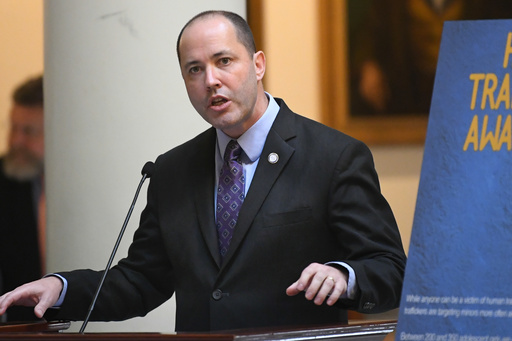ATLANTA — Georgia Attorney General Chris Carr has successfully raised an impressive $2.2 million for his campaign for the 2026 gubernatorial election, accomplishing this feat within two months of his announcement in November.
Lieutenant Governor Burt Jones, who could potentially emerge as Carr’s primary competitor in the GOP primary, has garnered $1.7 million for his leadership committee, according to recent filings.
However, a lingering question remains regarding the usage of these funds by Jones in the upcoming Republican primary. A federal ruling in 2022 determined that incumbent Governor Brian Kemp was prohibited from using assets from his leadership committee against challenger David Perdue during a GOP primary contest.
Heath Garrett, a strategist for Carr, noted that this ruling still holds significant weight. He stated, “That cannot be spent on anything that furthers his Republican primary campaign for governor.”
In response, Loree Anne Paradise, Jones’ chief of staff, indicated that Jones, who has indicated his consideration of a gubernatorial run, is primarily focused on a conservative agenda.
“Republicans in Georgia should concentrate on achieving results and collaborating with President Trump to improve our country, rather than engaging in political games and lamenting campaign finance regulations,” Paradise remarked.
Under Georgia law, leadership committees possess powerful fundraising capabilities. Candidates like Carr are restricted to contributions of a maximum of $8,400 for the May 2026 primary and face limitations on fundraising during legislative sessions, including the current session that commenced on January 13. Additionally, they cannot coordinate fundraising efforts with other committees.
In contrast, leadership committees are unfettered in their fundraising, allowing unlimited contributions even during legislative sessions, and they can coordinate directly with candidates. Current leadership committee operators include Jones, Kemp, and both the Democratic and Republican caucuses in the House and Senate. Candidates for governor and lieutenant governor like Carr would only gain these fundraising privileges if they secure their party’s nomination.
This evident imbalance within the campaign finance framework prompted both Perdue and Democrat Stacey Abrams to pursue legal action against Kemp’s leadership committee in 2022, shortly after the fundraising structure was established in 2021.
U.S. District Judge Mark Cohen ruled in Perdue’s favor, determining that the law infringed on free speech rights by engendering an “unequal” campaign finance landscape that favored candidates with control over leadership committees.
Carr’s office has typically defended the leadership committee law whenever challenged in court. Kemp leveraged his leadership committee not just to facilitate his own reelection in 2022 but also to support candidates in the 2024 legislative races. State law stipulates that associated funds can be utilized “for the purpose of affecting the outcome of any election or advocating for the election or defeat of any candidate.”
Currently, Carr’s campaign team is content with their fundraising results, predominantly supported by Georgia’s business sector. Notable contributions include $8,400 from former Southern Co. CEO Tom Fanning, former CEO of Synovus Corp. Kessel Stelling Jr., and former Home Depot CEO Bob Nardelli along with his spouse, among other prominent business figures.
These donations reflect Carr’s past role as an economic development commissioner before becoming the chief legal representative of Georgia. He has also amassed nearly $29,000 from the family of the late U.S. Senator Johnny Isakson, whom he previously worked under.
On the other hand, Jones’ leadership committee has the capacity to accept far larger individual donations, including a significant $100,000 from the American Health & Wellness Association, a political action committee that has not made any filings with the state Ethics Commission or the Federal Election Commission.
Jones’ leadership committee secured over a dozen contributions of $25,000 or more, with many originating from entities lobbying various legislative issues, including sports betting and legal reform advocacy groups. Furthermore, a significant portion of contributions came from plaintiff’s lawyers opposed to reforms that Kemp labels as “tort reform.”
As the campaign progresses, fundraising will likely take on heightened importance for Carr since Jones has substantial personal wealth that could bolster his campaign finances even if access to his leadership committee resources is limited.
While Carr has closely allied with Kemp, his journey may not be without challenges, particularly from supporters of former President Donald Trump during the primary. Jones has maintained a favorable relationship with Trump, positioning himself for the former president’s endorsement.
Trump has expressed dissatisfaction with Carr over his lack of support in efforts to contest the 2020 presidential election results in Georgia, leading to the former president endorsing a primary opponent who ultimately lost to Carr in 2022.



